实验3:OpenFlow协议分析实践
一、实验目的
- 能够运用 wireshark 对 OpenFlow 协议数据交互过程进行抓包;
- 能够借助包解析工具,分析与解释 OpenFlow协议的数据包交互过程与机制。
二、实验环境
- 下载虚拟机软件Oracle VisualBox;
- 在虚拟机中安装Ubuntu 20.04 Desktop amd64,并完整安装Mininet;
三、实验要求
(一)基本要求
-
搭建下图所示拓扑,完成相关 IP 配置,并实现主机与主机之间的 IP 通信。用抓包软件获取控制器与交换机之间的通信数据包。

-
使用Miniedit构建拓扑结构:
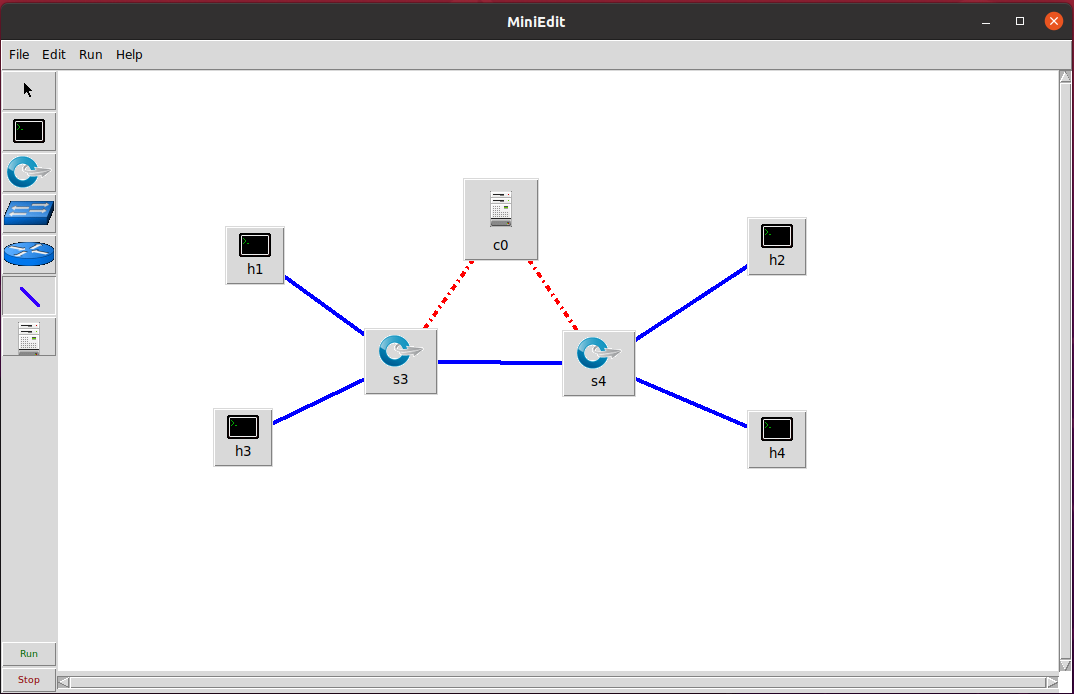
-
设置IP地址段和子网掩码:
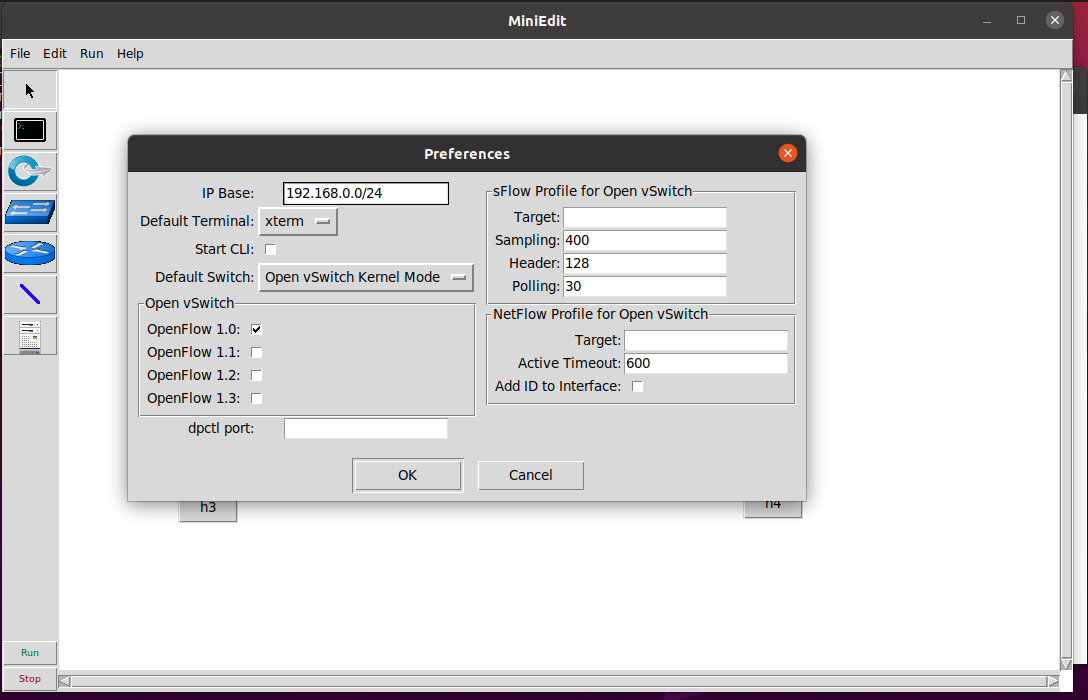
-
按要求修改主机地址等
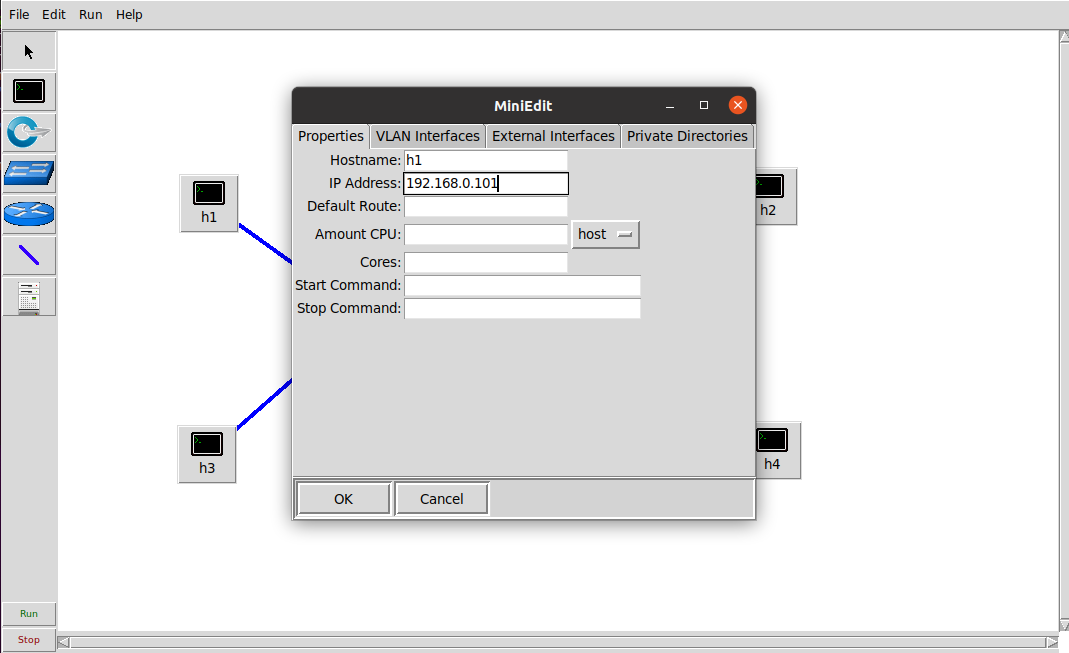
-
也可以在第一次实验拓扑结果的基础上直接修改:
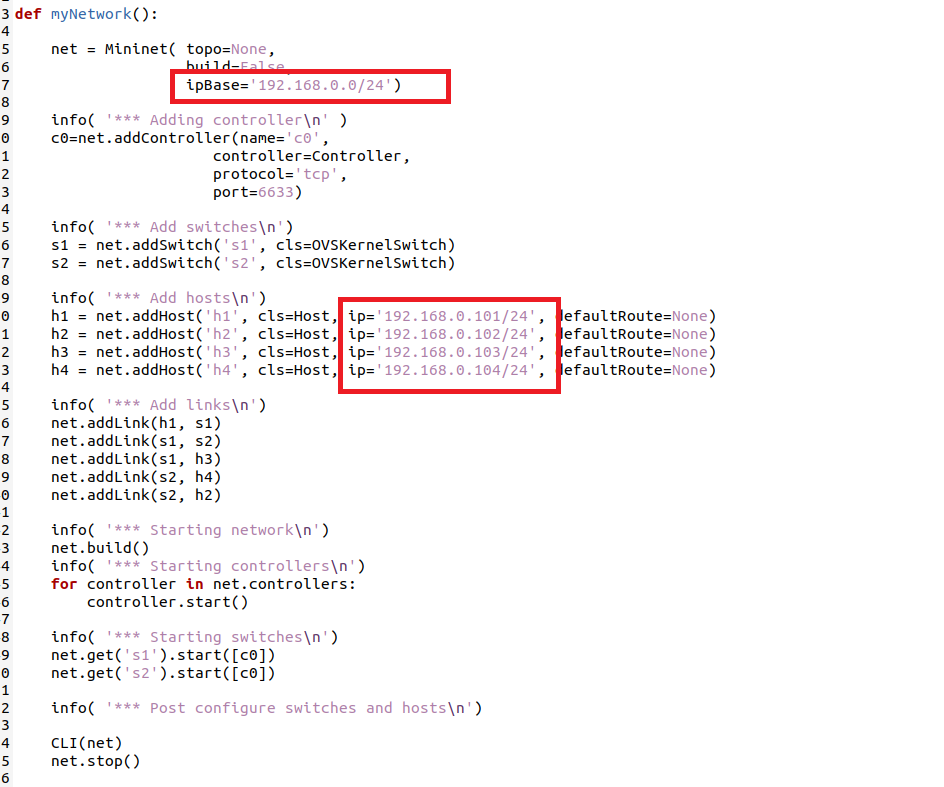
-
-
查看抓包结果,分析OpenFlow协议中交换机与控制器的消息交互过程,画出相关交互图或流程图。
-
运行wireshark,选择any模式,运行1.中的拓扑结构,并输入pingall命令。
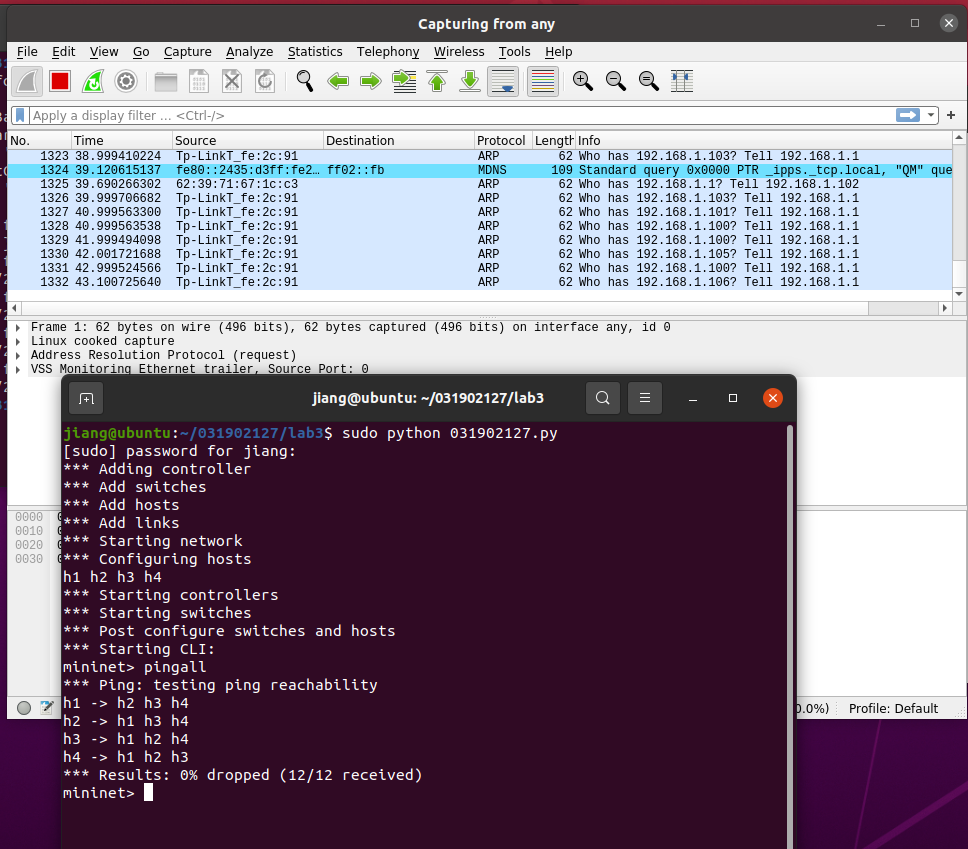
-
查看抓包结果:
-
OFPT_HELLO:
从控制器6633端口到交换机43544端口,使用OpenFlow1.0协议:
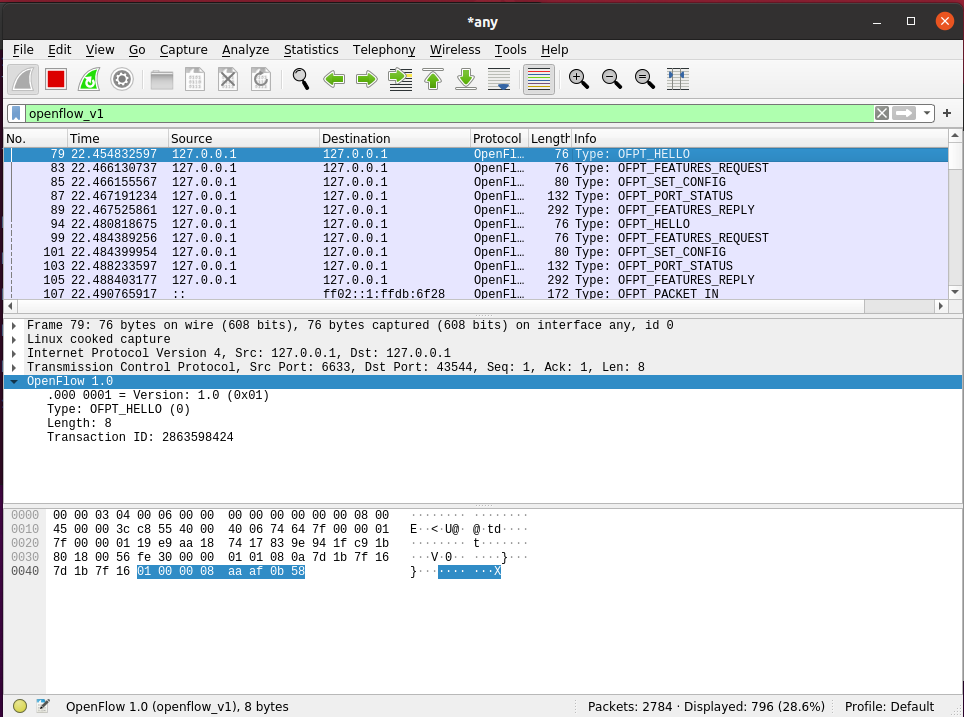
从交换机43544端口到控制器6633端口,使用OpenFlow1.5协议:
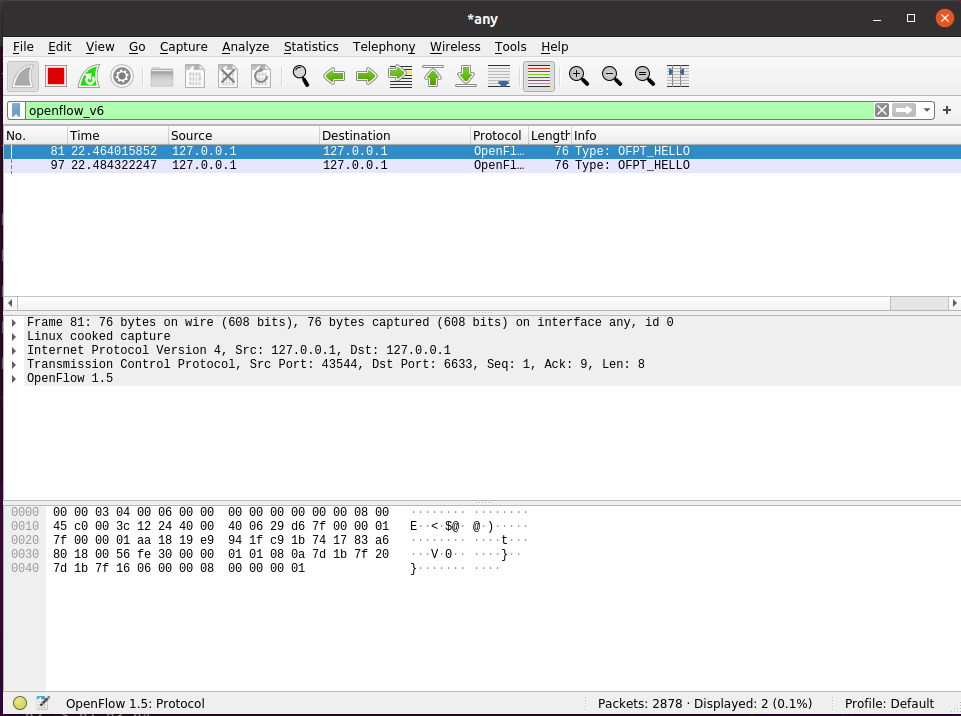
OFPT_HELLO后双方协定使用OpenFlow1.0协议。
-
OFPT_FEATURES_REQUEST
从控制器6633端口到交换机43544端口,请求特征信息。
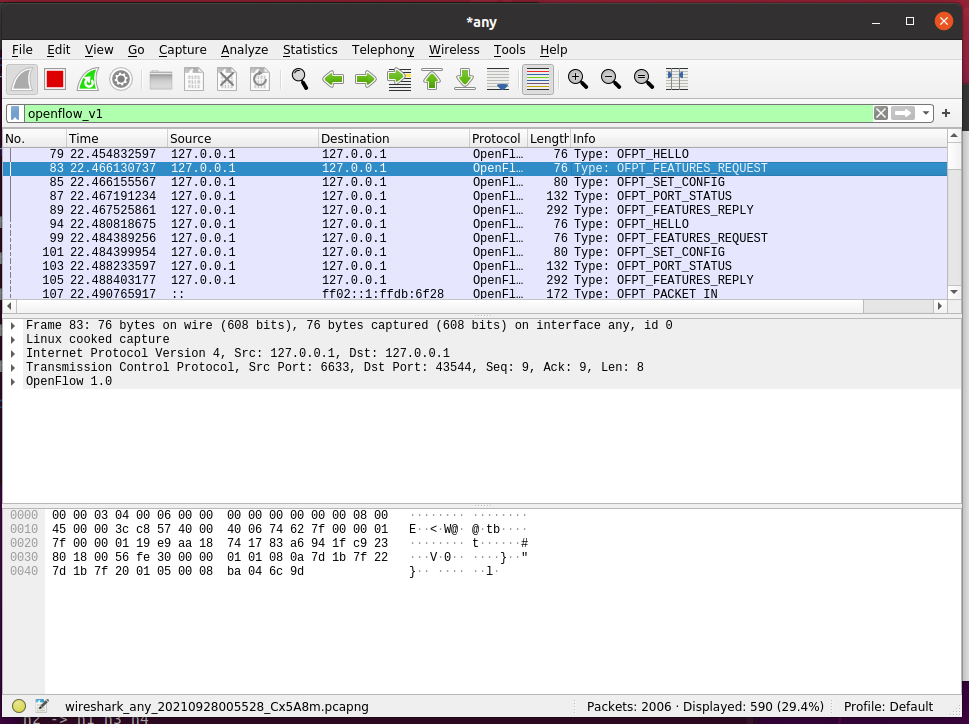
-
OFPT_SET_CONFIG:
从控制器6633接口到交换机43544端口
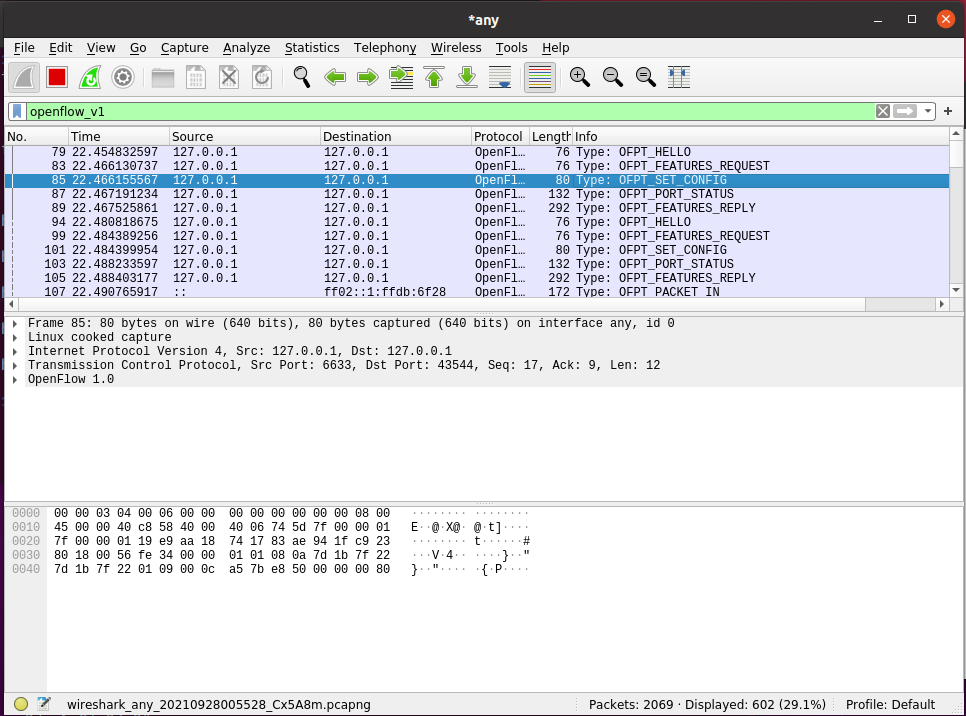
-
OFPT_PORT_STATUS:
从交换机43544端口到控制器6633端口当交换机端口发生变化时,告知控制器相应的端口状态。
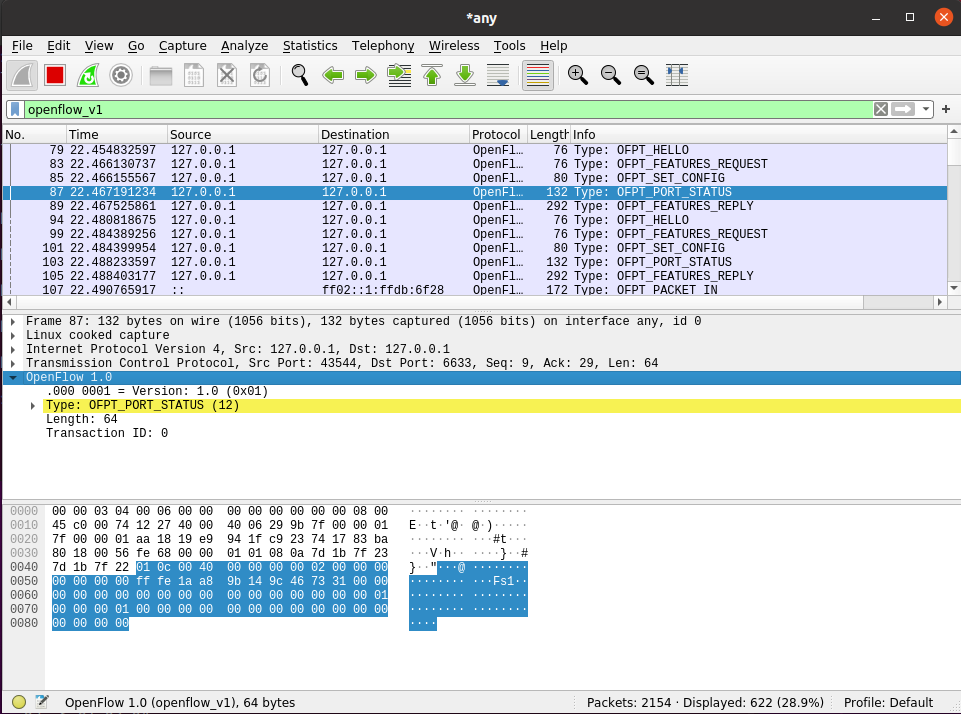
-
OFPT_FEATURES_REPLY:
交换机43544端口到控制器6633端口,回复特征信息。
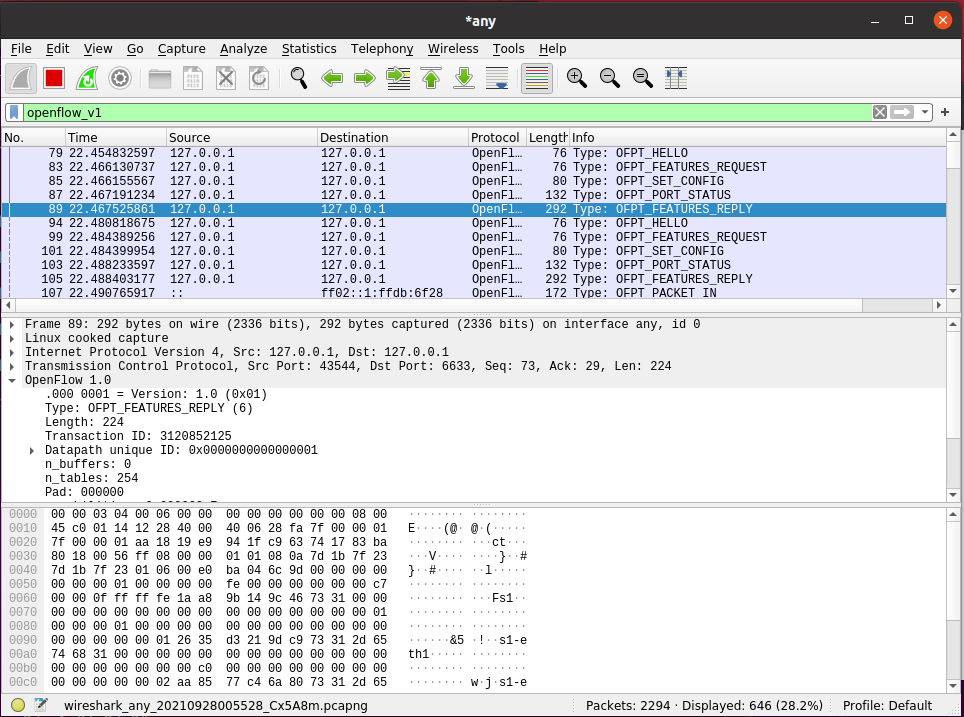
-
OFPT_PACKET_IN:
分析抓取的数据包。
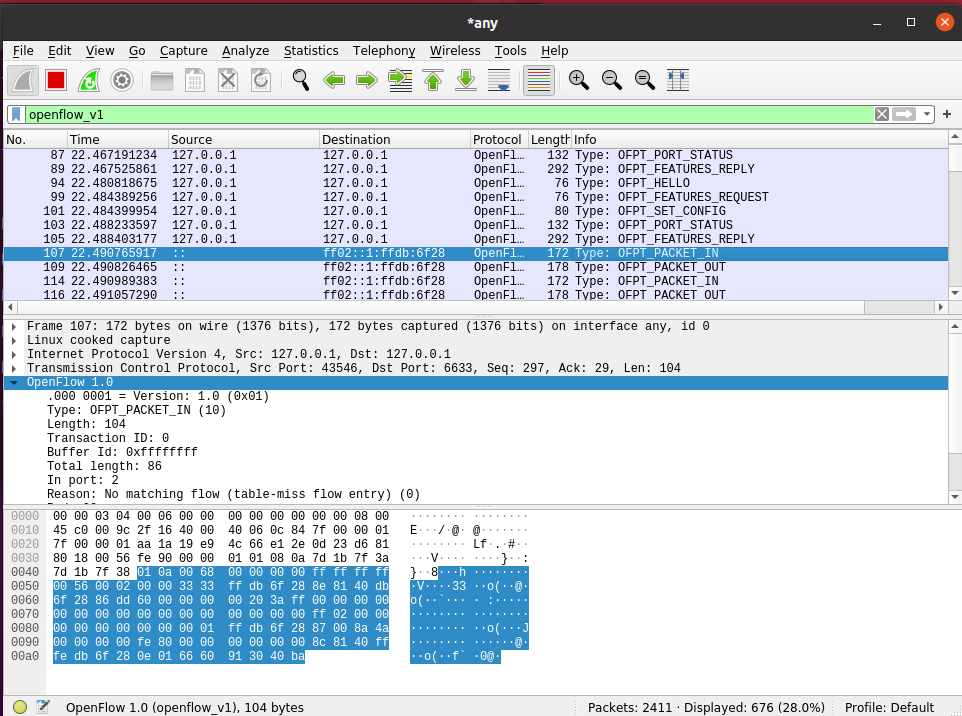
-
OFPT_FLOW_MOD:
分析抓取的flow_mod数据包,控制器通过6633端口向交换机43546端口下发流表项,指导数据的转发处理。
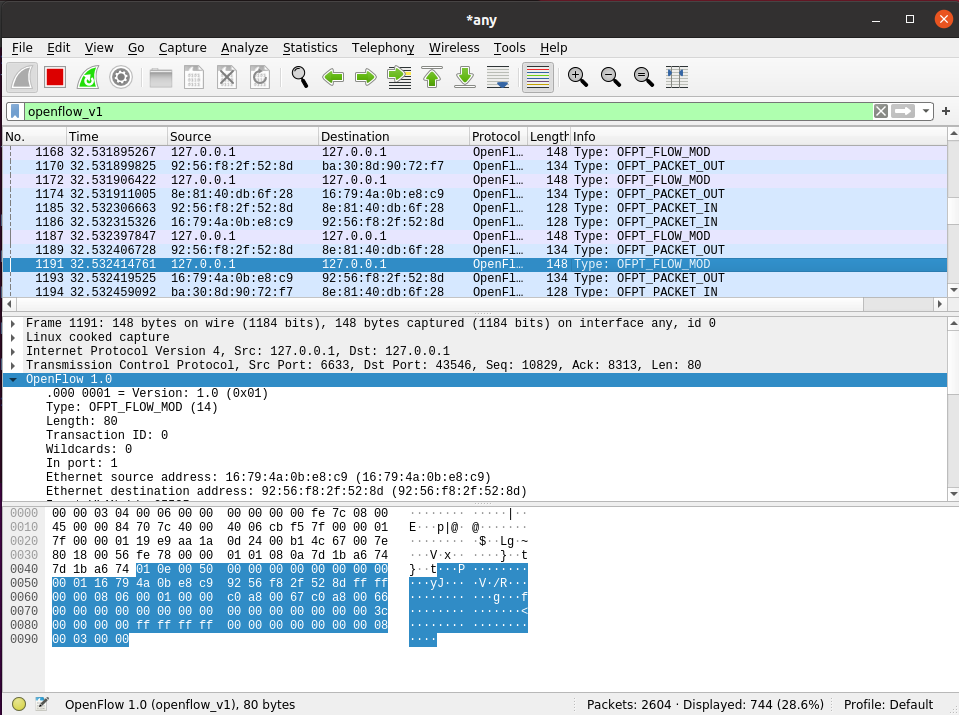
-
OFPT_PACKET_OUT:
控制器6633端口向交换机43546端口发送数据,并告知交换机输出到65531端口。
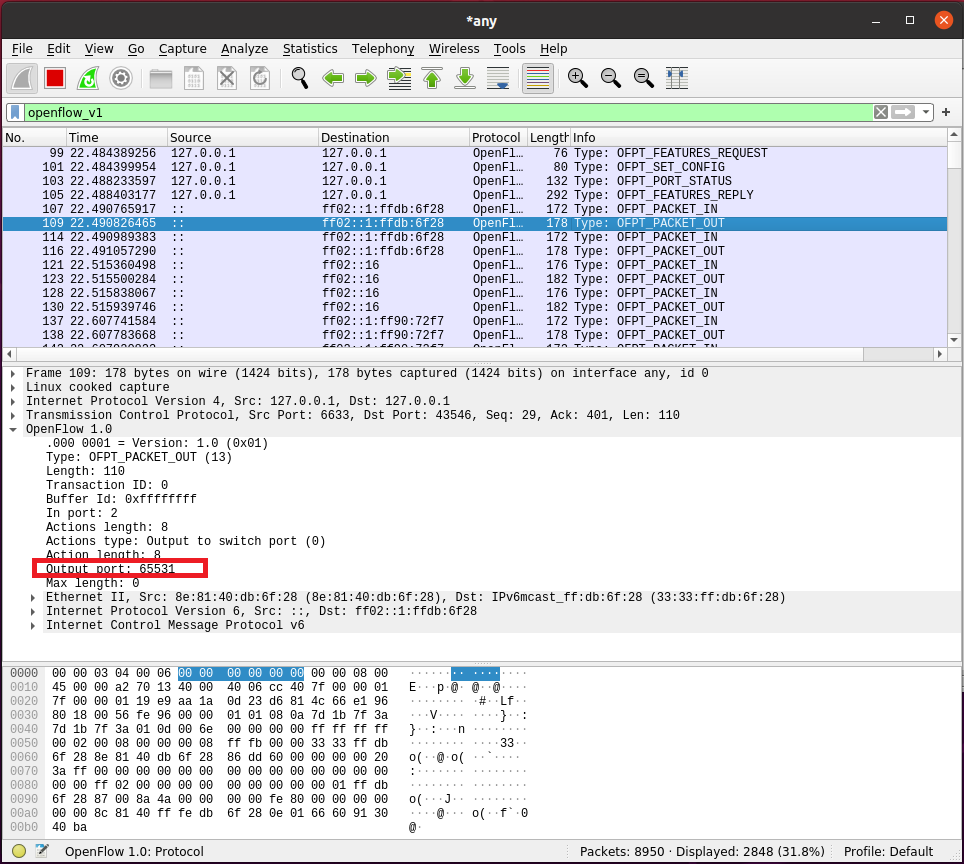
-
- 流程图:
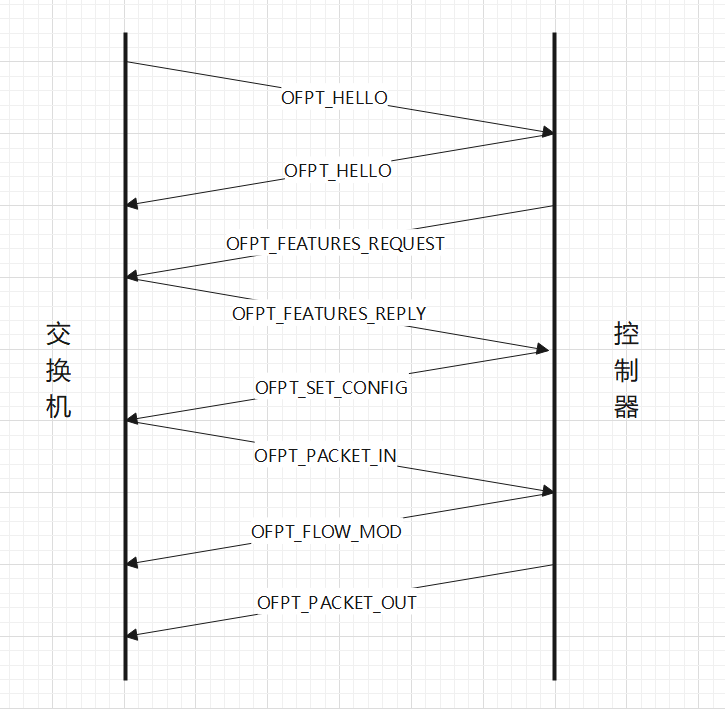
-
-
回答问题:交换机与控制器建立通信时是使用TCP协议还是UDP协议?
使用TCP协议,可以在抓取的数据包中体现
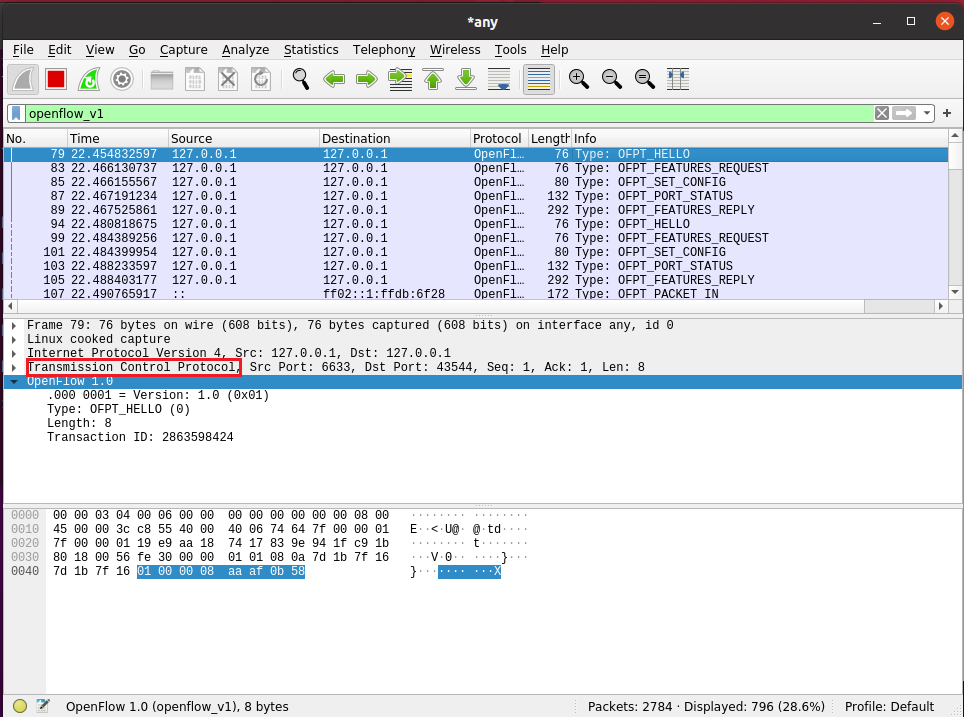
也可以直接查看拓扑代码
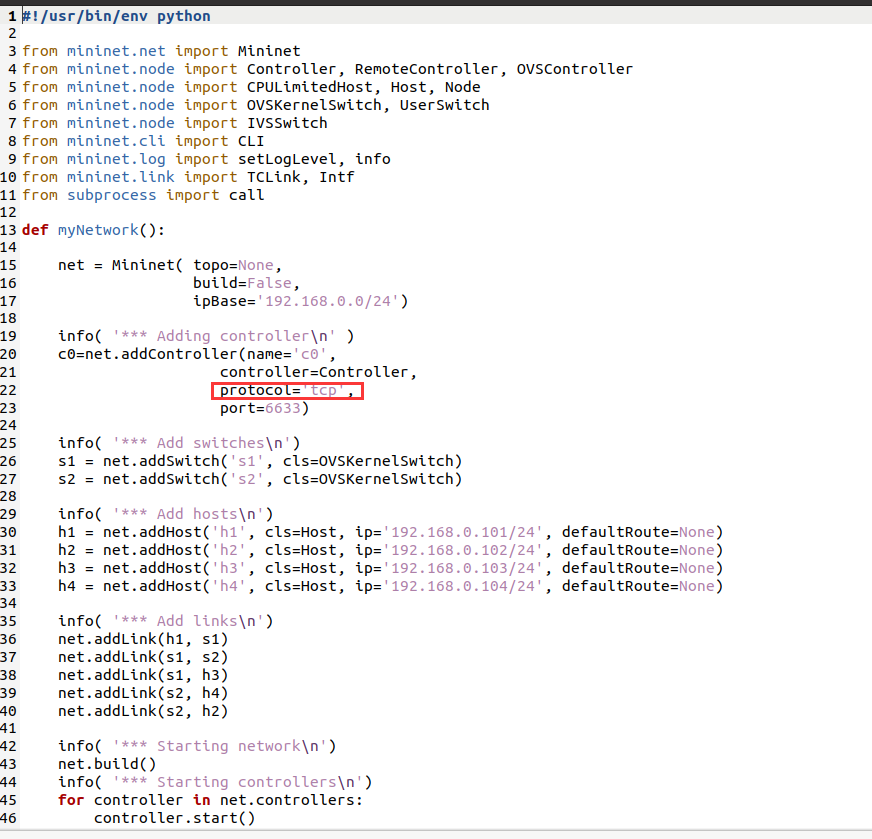
(二)进阶要求
-
将抓包结果对照OpenFlow源码,了解OpenFlow主要消息类型对应的数据结构定义。
-
所有信号类型:
enum ofp_type { /* Immutable messages. */ OFPT_HELLO, /* Symmetric message */ OFPT_ERROR, /* Symmetric message */ OFPT_ECHO_REQUEST, /* Symmetric message */ OFPT_ECHO_REPLY, /* Symmetric message */ OFPT_VENDOR, /* Symmetric message */ /* Switch configuration messages. */ OFPT_FEATURES_REQUEST, /* Controller/switch message */ OFPT_FEATURES_REPLY, /* Controller/switch message */ OFPT_GET_CONFIG_REQUEST, /* Controller/switch message */ OFPT_GET_CONFIG_REPLY, /* Controller/switch message */ OFPT_SET_CONFIG, /* Controller/switch message */ /* Asynchronous messages. */ OFPT_PACKET_IN, /* Async message */ OFPT_FLOW_REMOVED, /* Async message */ OFPT_PORT_STATUS, /* Async message */ /* Controller command messages. */ OFPT_PACKET_OUT, /* Controller/switch message */ OFPT_FLOW_MOD, /* Controller/switch message */ OFPT_PORT_MOD, /* Controller/switch message */ /* Statistics messages. */ OFPT_STATS_REQUEST, /* Controller/switch message */ OFPT_STATS_REPLY, /* Controller/switch message */ /* Barrier messages. */ OFPT_BARRIER_REQUEST, /* Controller/switch message */ OFPT_BARRIER_REPLY, /* Controller/switch message */ /* Queue Configuration messages. */ OFPT_QUEUE_GET_CONFIG_REQUEST, /* Controller/switch message */ OFPT_QUEUE_GET_CONFIG_REPLY /* Controller/switch message */ }; -
OPFT_HELLO
/* Header on all OpenFlow packets. */ struct ofp_header { uint8_t version; /* OFP_VERSION. */ uint8_t type; /* One of the OFPT_ constants. */ uint16_t length; /* Length including this ofp_header. */ uint32_t xid; /* Transaction id associated with this packet. Replies use the same id as was in the request to facilitate pairing. */ }; /* OFPT_HELLO. This message has an empty body, but implementations must * ignore any data included in the body, to allow for future extensions. */ struct ofp_hello { struct ofp_header header; };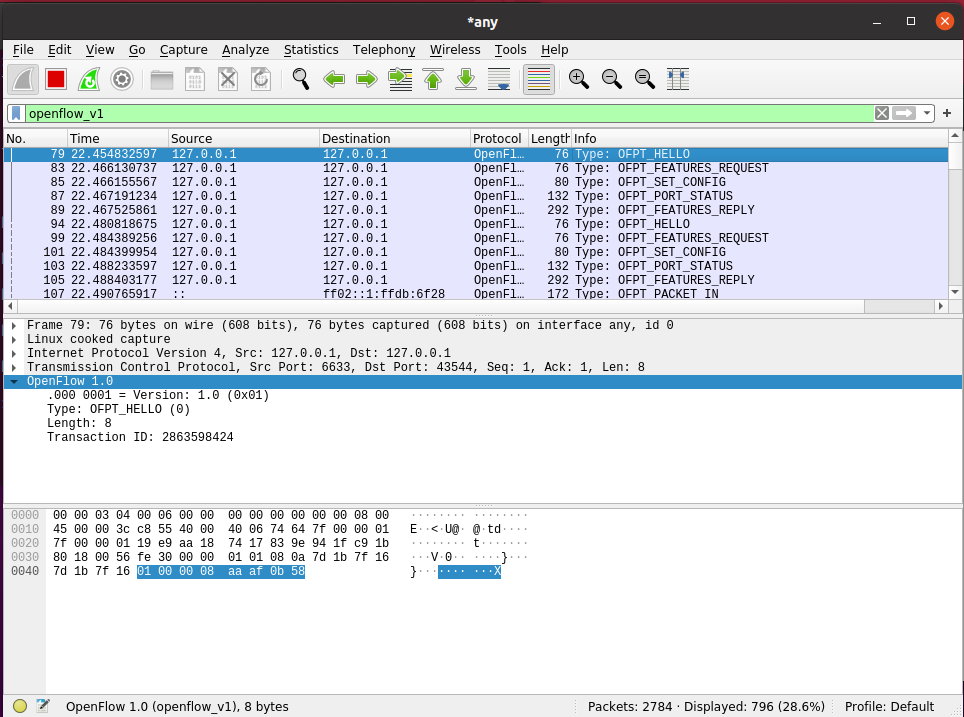
-
OFPT_FEATURES_REQUEST
结构与HELLO相似
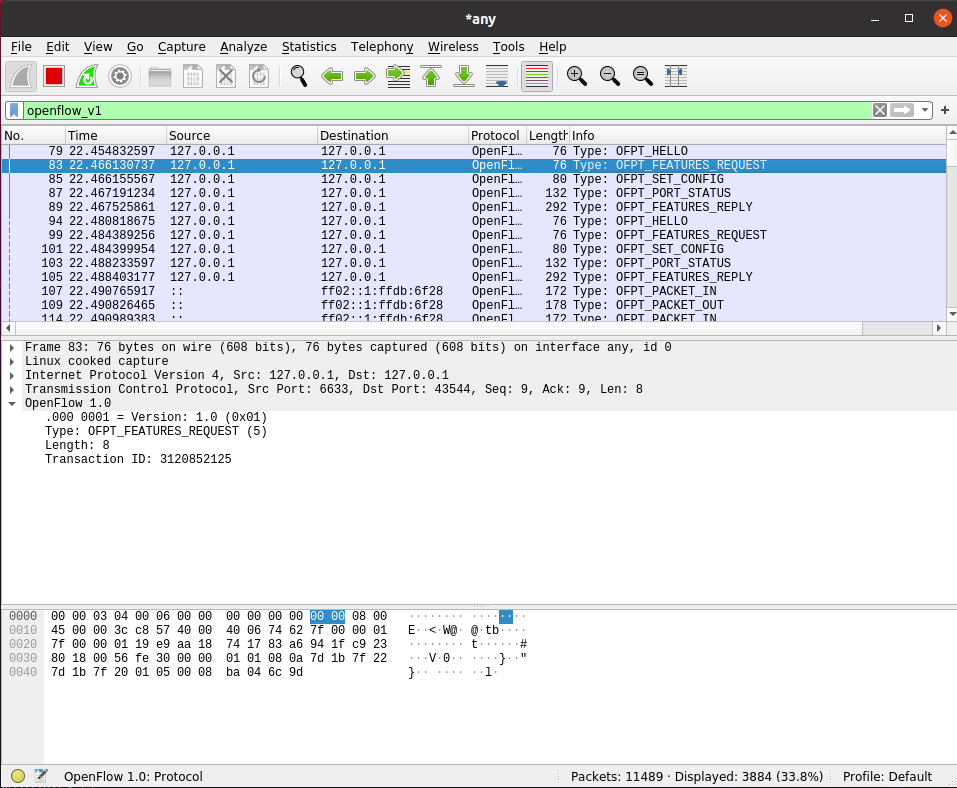
-
OFPT_SET_CONFIG
/* Switch configuration. */ struct ofp_switch_config { struct ofp_header header; uint16_t flags; /* OFPC_* flags. */ uint16_t miss_send_len; /* Max bytes of new flow that datapath should send to the controller. */ };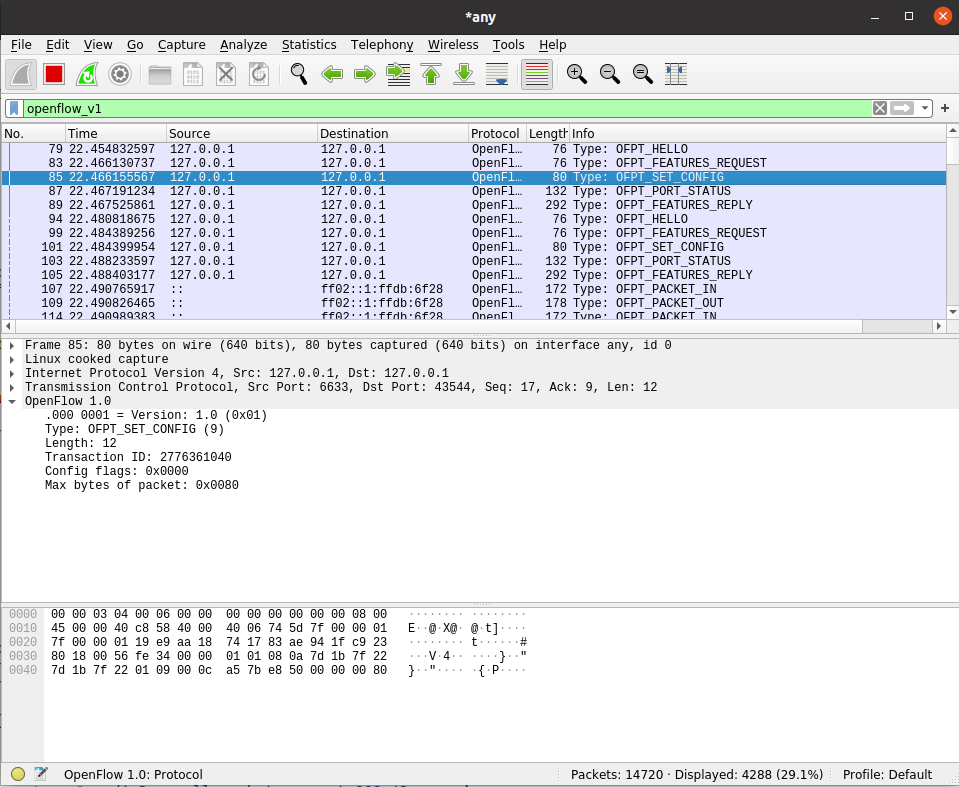
-
OFPT_PORT_STATUS
/* A physical port has changed in the datapath */ struct ofp_port_status { struct ofp_header header; uint8_t reason; /* One of OFPPR_*. */ uint8_t pad[7]; /* Align to 64-bits. */ struct ofp_phy_port desc; };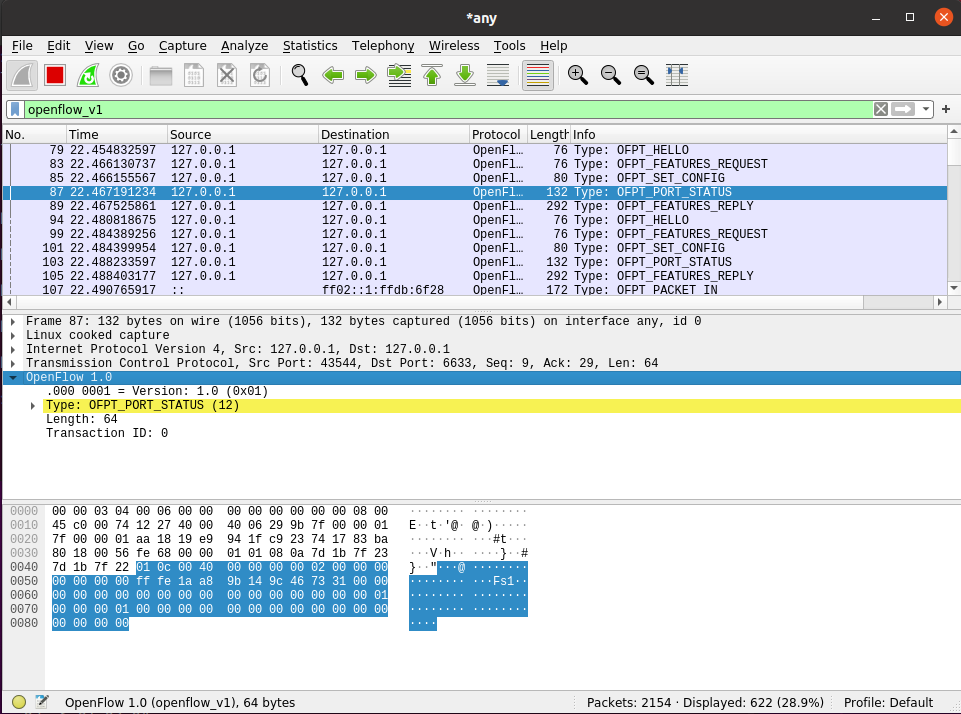
-
OFPT_FEATURES_REPLY
/* Description of a physical port */ struct ofp_phy_port { uint16_t port_no; uint8_t hw_addr[OFP_ETH_ALEN]; char name[OFP_MAX_PORT_NAME_LEN]; /* Null-terminated */ uint32_t config; /* Bitmap of OFPPC_* flags. */ uint32_t state; /* Bitmap of OFPPS_* flags. */ /* Bitmaps of OFPPF_* that describe features. All bits zeroed if * unsupported or unavailable. */ uint32_t curr; /* Current features. */ uint32_t advertised; /* Features being advertised by the port. */ uint32_t supported; /* Features supported by the port. */ uint32_t peer; /* Features advertised by peer. */ }; /* Switch features. */ struct ofp_switch_features { struct ofp_header header; uint64_t datapath_id; /* Datapath unique ID. The lower 48-bits are for a MAC address, while the upper 16-bits are implementer-defined. */ uint32_t n_buffers; /* Max packets buffered at once. */ uint8_t n_tables; /* Number of tables supported by datapath. */ uint8_t pad[3]; /* Align to 64-bits. */ /* Features. */ uint32_t capabilities; /* Bitmap of support "ofp_capabilities". */ uint32_t actions; /* Bitmap of supported "ofp_action_type"s. */ /* Port info.*/ struct ofp_phy_port ports[0]; /* Port definitions. The number of ports is inferred from the length field in the header. */ };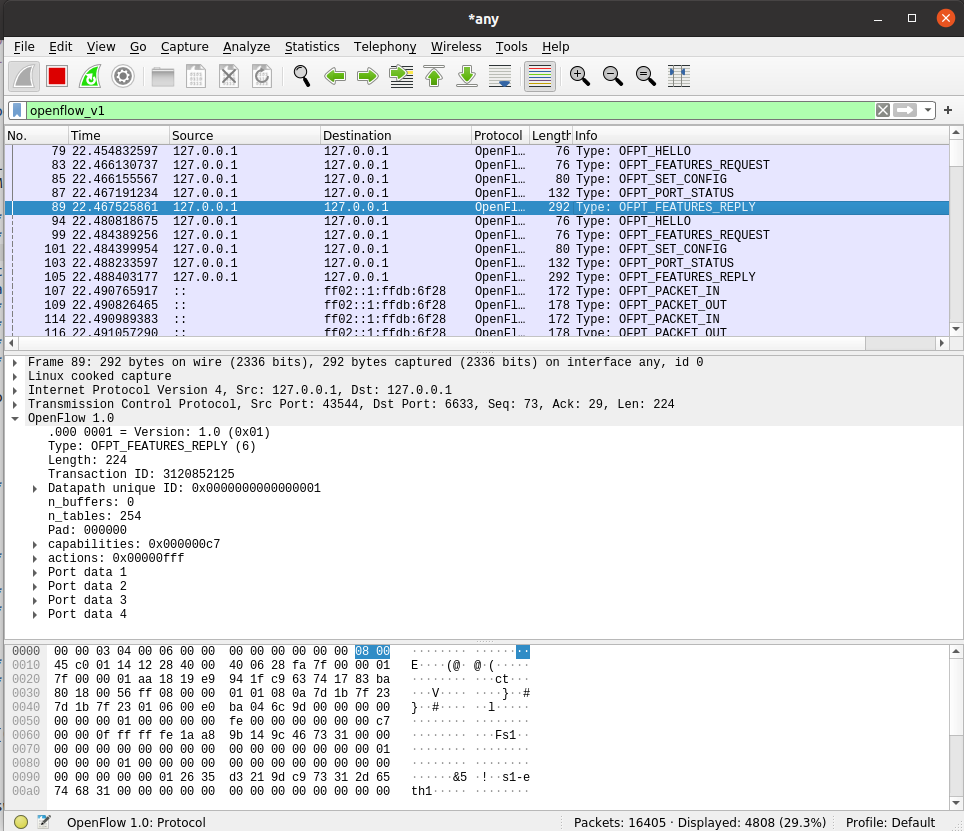
-
OFPT_PACKET_IN
struct ofp_packet_in { struct ofp_header header; uint32_t buffer_id; /* ID assigned by datapath. */ uint16_t total_len; /* Full length of frame. */ uint16_t in_port; /* Port on which frame was received. */ uint8_t reason; /* Reason packet is being sent (one of OFPR_*) */ uint8_t pad; uint8_t data[0]; /* Ethernet frame, halfway through 32-bit word, so the IP header is 32-bit aligned. The amount of data is inferred from the length field in the header. Because of padding, offsetof(struct ofp_packet_in, data) == sizeof(struct ofp_packet_in) - 2. */ };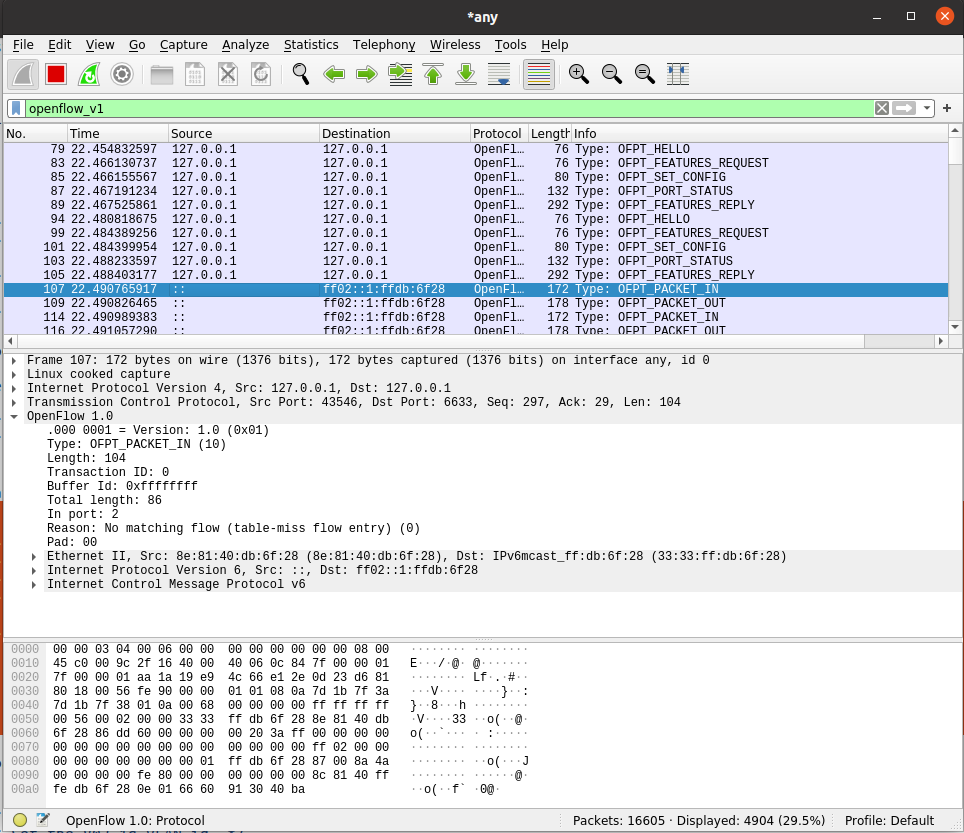
-
OFPT_FLOW_MOD
struct ofp_flow_mod { struct ofp_header header; struct ofp_match match; /* Fields to match */ uint64_t cookie; /* Opaque controller-issued identifier. */ /* Flow actions. */ uint16_t command; /* One of OFPFC_*. */ uint16_t idle_timeout; /* Idle time before discarding (seconds). */ uint16_t hard_timeout; /* Max time before discarding (seconds). */ uint16_t priority; /* Priority level of flow entry. */ uint32_t buffer_id; /* Buffered packet to apply to (or -1). Not meaningful for OFPFC_DELETE*. */ uint16_t out_port; /* For OFPFC_DELETE* commands, require matching entries to include this as an output port. A value of OFPP_NONE indicates no restriction. */ uint16_t flags; /* One of OFPFF_*. */ struct ofp_action_header actions[0]; /* The action length is inferred from the length field in the header. */ };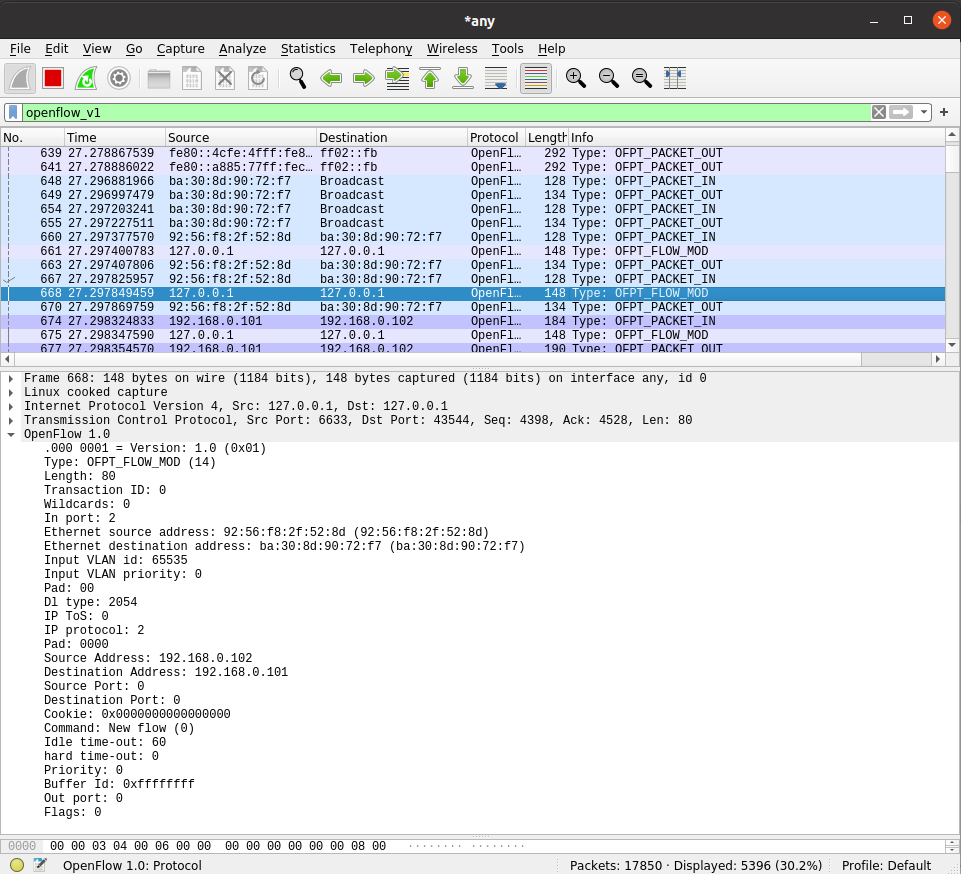
-
OFPT_PACKET_OUT
/* Send packet (controller -> datapath). */ struct ofp_packet_out { struct ofp_header header; uint32_t buffer_id; /* ID assigned by datapath (-1 if none). */ uint16_t in_port; /* Packet's input port (OFPP_NONE if none). */ uint16_t actions_len; /* Size of action array in bytes. */ struct ofp_action_header actions[0]; /* Actions. */ /* uint8_t data[0]; */ /* Packet data. The length is inferred from the length field in the header. (Only meaningful if buffer_id == -1.) */ };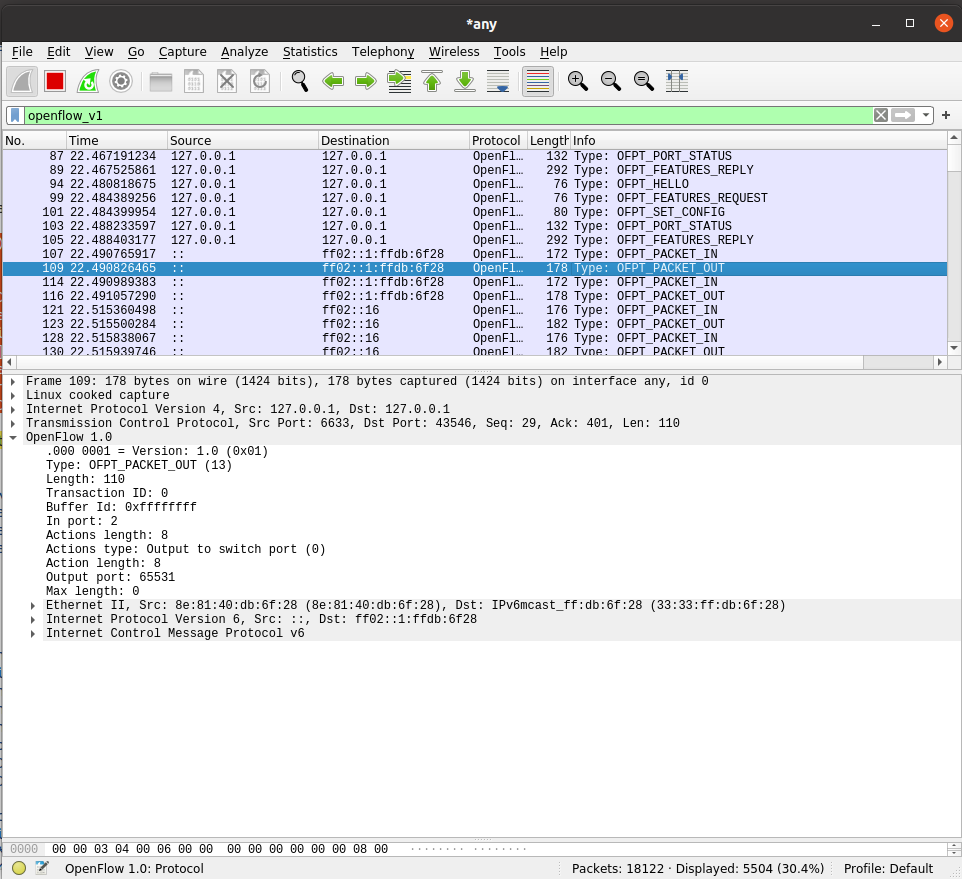
-
四、心得
实验难度:
- 本次实验以验证性实验为主,主要是了解并掌握OpenFlow通讯过程中,数据包的流动过程和对应的信息数据结构,对比前几次实验较为简单。
实验过程遇到的困难及解决办法:
- 运行wireshark后,运行拓扑结构后,未在抓包列表中找到OFPT_FLOW_MOD类型,多次重复无果后,尝试输入pingall得到想要的结果
心得:
- 本次实验难度较低,更重要的是对于OpenFlow协议的数据包交互过程与机制的了解与学习,面对较多的信息内容,实验过程中需要有耐心,一步一步地去完成。
- 对于wireshark的使用更加熟练,也了解到了对应数据包内容的含义,对OpenFlow协议有了进一步的了解。



